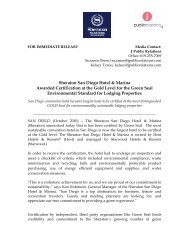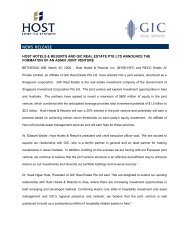Host Marriott 2004 Annual Report - Host Hotels & Resorts, Inc
Host Marriott 2004 Annual Report - Host Hotels & Resorts, Inc
Host Marriott 2004 Annual Report - Host Hotels & Resorts, Inc
Create successful ePaper yourself
Turn your PDF publications into a flip-book with our unique Google optimized e-Paper software.
other investments which we record using the equity method<br />
of accounting. These entities are considered to be voting<br />
interest entities. The debt on these investments is nonrecourse<br />
to the company and the effect of their operations on<br />
our results of operations is not material. While we do not<br />
believe we are required to consolidate any of our current<br />
partnerships or joint ventures, if we were required to do so,<br />
then all of the results of operations and the assets and liabilities<br />
would be included in our financial statements. For further<br />
detail on our unconsolidated entities see Note 3 to our<br />
consolidated financial statements.<br />
APPLICATION OF NEW ACCOUNTING STANDARDS<br />
During November <strong>2004</strong>, the Financial Accounting Standards<br />
Board (the “FASB”) ratified the Emerging Issues Task Force on<br />
EITF Issue No. 04-8, “The Effect of Contingently Convertible<br />
Debt on Diluted Earnings per Share.” EITF 04-8 requires contingently<br />
convertible debt instruments to be included in diluted<br />
earnings per share, if dilutive, regardless of whether a market<br />
price contingency for the conversion of the debt into common<br />
shares or any other contingent factor has been met. Prior to this<br />
consensus, such instruments were excluded from the calculation<br />
of the diluted earnings per share until one or more of the<br />
contingencies were met. EITF 04-8 is effective for reporting<br />
periods ending after December 15, <strong>2004</strong>, and does require<br />
restatement of prior period earnings per share amounts. As a<br />
result, we will include the common shares that are issuable from<br />
the conversion of the Exchangeable Senior Debentures, if dilutive,<br />
in our diluted earnings (loss) per share.<br />
In December <strong>2004</strong>, the FASB issued SFAS No. 123R,<br />
Share-Based Payment, (“FAS 123R”), which requires that the<br />
cost resulting from all share-based payment transactions be<br />
recognized in the financial statements. The statement requires a<br />
public entity to measure the cost of employee services received<br />
in exchange for an award of equity instruments based on the<br />
grant-date fair value of the award (with limited exceptions).<br />
That cost will be recognized over the period during which an<br />
employee is required to provide service in exchange for the<br />
award—the requisite service period (usually the vesting period).<br />
No compensation cost is recognized for equity instruments for<br />
which employees do not render the requisite service. Employee<br />
share purchase plans will not result in recognition of compensation<br />
cost if certain conditions are met; those conditions are<br />
much the same as the related conditions in FAS 123. The provisions<br />
of FAS 123R are effective as of the beginning of the first<br />
interim or annual reporting period that begins after June 15,<br />
2005. The adoption of this standard in 2005 will not have a<br />
material effect on our consolidated financial position and<br />
results of operations.<br />
REPORTING PERIODS<br />
REPORTING PERIODS FOR CONSOLIDATED<br />
STATEMENT OF OPERATIONS<br />
The results we report are based on results of our hotels<br />
reported to us by our hotel managers. Our hotel managers use<br />
different reporting periods. <strong>Marriott</strong> International, the manager<br />
of the majority of our properties, uses a year ending on the<br />
Friday closest to December 31 and reports twelve weeks of<br />
operations for the first three quarters and sixteen or seventeen<br />
weeks for the fourth quarter of the year for its <strong>Marriott</strong>-managed<br />
hotels. In contrast, other managers of our hotels, such as Hyatt,<br />
report results on a monthly basis. <strong>Host</strong> <strong>Marriott</strong>, as a REIT,<br />
is required by tax laws to report results on a calendar year. As a<br />
result, we elected to adopt the reporting periods used by<br />
<strong>Marriott</strong> International modified so that our fiscal year always<br />
ends on December 31 to comply with REIT rules. Our first<br />
three quarters of operations end on the same day as <strong>Marriott</strong><br />
International but our fourth quarter ends on December 31.<br />
Two consequences of the reporting cycle we have adopted<br />
are: (1) quarterly start dates will usually differ between years,<br />
except for the first quarter which always commences on January 1,<br />
and (2) our first and fourth quarters of operations and yearto-date<br />
operations may not include the same number of days as<br />
reflected in prior years. For example, set forth below are the<br />
quarterly start and end dates for <strong>2004</strong> and 2003. Note that the<br />
second and third quarters of <strong>2004</strong> and 2003 both reflect twelve<br />
weeks of operations. In contrast, the first and fourth quarters<br />
reflect differing days of operations.<br />
2005 <strong>2004</strong> (1) 2003<br />
START-END DATES NO. OF DAYS START-END DATES NO. OF DAYS START-END DATES NO. OF DAYS<br />
First Quarter January 1–March 25 84 January 1–March 26 86 January 1–March 28 87<br />
Second Quarter March 26–June 17 84 March 27–June 18 84 March 29–June 20 84<br />
Third Quarter June 18–September 9 84 June 19–September 10 84 June 21–September 12 84<br />
Fourth Quarter September 10–December 31 113 September 11–December 31 112 September 13–December 31 110<br />
(1)<br />
Reflects an additional day in February for the leap year.<br />
While the reporting calendar we adopted is more closely<br />
aligned with the reporting calendar used by the manager of<br />
a majority of our properties, one final consequence of our calendar<br />
is we are unable to report the month of operations that ends<br />
after our fiscal quarter-end until the following quarter because<br />
our hotel managers using a monthly reporting period do not make<br />
mid-month results available to us. Hence, the month of operation<br />
that ends after our fiscal quarter-end is included in our quarterly<br />
results of operations in the following quarter for those hotel<br />
managers (covering approximately one-fourth of our full-service<br />
hotels). As a result, our quarterly results of operations include<br />
results from hotel managers reporting results on a monthly basis<br />
as follows: first quarter ( January, February), second quarter<br />
(March to May), third quarter ( June to August) and fourth<br />
quarter (September to December). While this does not affect<br />
full year results, it does affect the reporting of quarterly results.<br />
36<br />
HOST MARRIOTT <strong>2004</strong>








